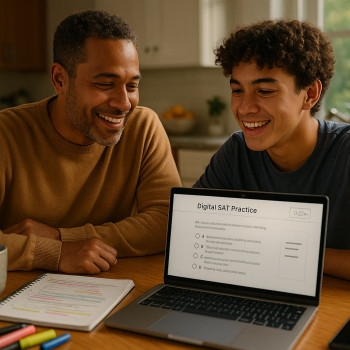How to Plan SAT Prep Around Festivals and Holidays (and Still Stay Sane)
Holidays can be magical—a time for family, food, and rituals that recharge your heart. But if you’re also preparing for the Digital SAT, they can feel like a double-edged sword: treasured downtime on one hand and a looming gap in your study plan on the other. The good news? With realistic planning, flexible strategies, and a few creative tricks, you can enjoy the celebrations and keep momentum toward your target score. This guide walks you through planning SAT study around festivals and holidays in a way that’s practical, humane, and actually enjoyable.
Why planning around holidays matters
Holidays interrupt routines—which is exactly what makes them so refreshing. But for SAT prep, interruptions can disrupt practice rhythm, reduce test stamina, and create last-minute stress. The goal isn’t to study every waking minute during a holiday; it’s to make small, meaningful choices that keep your skills warm and your confidence intact.
Start with a realistic baseline: audit your prep
Before you rearrange anything for an upcoming festival or holiday season, take stock of where you stand. That means one focused audit session (30–60 minutes) to answer three questions:
- What sections need the most work? (Reading, Writing & Language, Math—calculator and no-calculator)
- How many practice tests have I taken, and what’s my current score range?
- How much time can I realistically commit daily during normal weeks and during holidays?
Write the answers down. This becomes the north star that helps you decide what to prioritize when your schedule shrinks.
Quick example: a working audit
Imagine Maya. She’s three months out from her test. Her audit shows: weak in data-analysis questions on Math, good at grammar, needs more stamina for long reading passages. On regular weeks she can do 10–12 hours of prep; during a holiday break she can manage 2–3 hours. That difference shapes how she plans the holiday weeks: more short, focused sessions on stamina and targeted math practice, fewer full-length timed tests.
Map your calendar: identify pressure points and celebration windows
Pull up a calendar and mark:
- Test date (or ideal target test month)
- All upcoming festivals, holidays, travel days, and family events
- School/club obligations that will affect time
Now look at the weeks leading up to your test. Color-code them: green (regular study weeks), yellow (partial interruptions), red (full holiday weeks or travel). This visual will help you decide where to schedule longer practice tests, when to move deadlines, and where to accept lighter work.
Holiday timing strategies
- If a major holiday falls two weeks before your test: avoid scheduling a full-length practice test in that exact window. Use that full-length slot two weeks earlier.
- If the holiday is three to six weeks before the test: treat the holiday week as a targeted maintenance week, then plan a heavier practice cycle right after the holiday.
- If your holiday is more than six weeks out: plan a “deep work” period before the holiday to bank practice hours, then use the break for light review and rest.
Design flexible study blocks: quality over quantity
When time is limited, short, deliberate sessions beat long, distracted ones. Design study blocks you can do anywhere—on a train, at a relative’s house, or between events.
- Micro-blocks (20–30 minutes): focused practice on one skill (e.g., grammar rules, single passage reading, or specific math problem types).
- Power blocks (60–90 minutes): deeper focus—timed section practice, working on pacing, or a difficult math set.
- Recovery blocks (15–30 minutes): reflection, reviewing errors, or light vocabulary work.
Create a week template that blends these blocks so you can swap them in as needed. For example, during a heavy holiday week you might do one power block in the morning, two micro-blocks between events, and one recovery block before bed.
Use holiday energy—ritualize light, meaningful practice
Holidays bring rituals; use tiny rituals to keep studying pleasant. Here are simple ideas:
- Morning 20: read one dense paragraph aloud for 10 minutes to build reading stamina; spend 10 minutes fixing one math concept.
- After a meal, do a 15-minute grammar or vocabulary sprint—small, bite-sized wins after a feast are motivating.
- While traveling, listen to timed reading strategy audio (self-recorded tips or voice notes) to stay mentally warmed up.
Tailor practice types to holiday availability
Different kinds of practice fit different holiday rhythms. Match the activity to the time you’ll realistically have.
| Available Time | Best Activities | Why It Works |
|---|---|---|
| 10–30 minutes | Micro drills, single reading passages, grammar error-spotting, flashcards, mental math sets | Keeps skills fresh, low cognitive load, easy to fit between events |
| 30–60 minutes | Section practice (timed), review of missed questions, targeted concept work | Meaningful gains in a short window; simulates portion of test |
| 90–180 minutes | Full section simulations, deep review sessions, one full-length practice test when focused | Builds endurance and reveals pacing issues; best reserved for green weeks |
Two-week holiday plan example (practical template)
Use this as a plug-and-play approach for a typical festival that lasts a week plus travel days. The template presumes you want to keep momentum without missing the celebration.
- Days 1–3 (pre-holiday): bank practice. Do one full-length adaptive practice test on Bluebook-style app or a timed simulation. Spend 45–60 minutes reviewing mistakes each evening.
- Days 4–10 (holiday week): lightweight maintenance—two micro-blocks per day (20–30 minutes each) focusing on your weakest area + one recovery block (15 minutes) reviewing error logs. No full tests.
- Days 11–14 (post-holiday ramp-up): do two power blocks (60–90 minutes) focusing on pacing and one shorter timed section. Take a short practice test on day 14 to assess how your skills held up.
This balances celebration with a low-burden plan to preserve neural pathways and reduce the anxiety of starting again.
Practical study techniques that travel well
Traveling to grandparents or to a festival? These techniques require minimal gear and big impact:
- Paper mini-sprints: print 2–3 targeted practice problems and tackle them with a timer.
- Flashcard habit: keep a small stack of cards for grammar rules, math formulas, and idioms.
- Audio strategy drills: record yourself summarizing how to approach evidence-based reading questions and listen on the go.
- Group study with boundaries: if family members ask about your SAT prep, say you’ll do a 30-minute focused session and then join them—this sets expectations and protects study time.
When to use practice tests vs. targeted practice
Full practice tests are golden for pacing and endurance—but they’re not always the best choice during holiday periods. Use this rule of thumb:
- If you have an uninterrupted 3–4 hour window and you’re in a green week → take a full practice test.
- If you have fragmented time, or it’s a red holiday week → do targeted sessions that attack weak spots and preserve mental energy.
- After any test, spend at least 60 minutes reviewing—not just tallying missed answers but understanding why you missed them and how to avoid the trap next time.
How Sparkl fits naturally into holiday planning
Sometimes you need smart shortcuts: a targeted walk-through of a tricky math concept, a rapid-fire grammar review, or a mock-section with immediate feedback. That’s where Sparkl’s personalized tutoring can be a perfect fit—especially around holidays. With 1-on-1 guidance, tailored study plans, expert tutors, and AI-driven insights, Sparkl helps you maximize shorter study windows and get quick, targeted improvements without guessing what to study next.
Strategies to protect mental energy and test-day readiness
Holidays can be emotionally rich but mentally draining. Buffer your test prep with habits that preserve cognitive energy:
- Sleep priority: aim for consistent sleep during prep. One late night after a party should be a conscious choice—not a derailment.
- Hydration and nutrition: heavy meals can induce post-meal sluggishness—opt for balanced snacks before study blocks.
- Move daily: 15–30 minutes of light exercise resets focus and improves memory consolidation.
- Mental boundaries: schedule a daily “no-study” window to be fully present with family and recharge.
Use mistake logs and micro-goals to stay efficient
Keep a simple mistake log—no more than a sheet or a note in your phone. For every practice question you miss, write:
- Question type (e.g., grid-in algebra, evidence-based reading—main idea)
- Mistake reason (careless, concept gap, time pressure, misread)
- One sentence fix (e.g., rework order of operations, underline question stem)
On holiday days, review 5–10 items from this log instead of doing fresh practice—this targeted review yields higher ROI than random practice when time is limited.
Turn family time into low-pressure study moments
If your family is supportive, create light, fun ways to weave SAT prep in without ruining the vibe:
- Grammar game: spot the sentence error in a social media post or a holiday card.
- Math around the kitchen: estimate ingredient ratios or divide a recipe—real-world math keeps concepts alive.
- Reading aloud: take turns reading a short paragraph and summarizing the main point—this builds comprehension and is surprisingly fun.
What to do the week before a festival-heavy month
When you know a month will be packed with festivals, frontload the work. The week before, aim to:
- Take one full adaptive practice test to benchmark.
- Complete a targeted study sprint on your weakest topic for 3–4 sessions of 60 minutes each.
- Finalize a light holiday study routine—micro-blocks and one recovery block per day.
Getting this work done reduces guilt during the holiday and makes the post-holiday return smoother.
How to recover momentum after a long holiday
It’s normal to feel a little rusty after a big break. Don’t try to punish yourself with an 8-hour study day. Follow a phased re-entry:
- Day 1: Do a diagnostic mini-test (one reading section + one math section) and analyze mistakes for 45–60 minutes.
- Days 2–4: Focused power blocks (60–90 minutes) on the two most frequent error types from your diagnostic.
- Day 5: Full or near-full practice test if you feel mentally ready; otherwise, another pair of targeted sections.
Consistency beats intensity here. Small, daily wins rebuild momentum quickly.
Sample 8-week plan around a major festival (plug-and-play)
Below is a blueprint that assumes a test date eight weeks from now and a major festival in week 4. Adjust the timing to fit your test date and life schedule.
| Weeks | Focus | Weekly Plan Snapshot |
|---|---|---|
| Weeks 1–2 | Baseline & skill building | One full practice test, 3 power blocks per week, targeted error-log work, 3 micro-blocks daily |
| Week 3 | Intensify timing | Two full sections timed, pacing drills, review troublesome concepts, light review on weekends |
| Week 4 (Festival) | Maintenance | Micro-blocks only (20–30 min x2 daily), 1 recovery block, focus on mistake log |
| Week 5 | Ramp back up | Two power blocks, one timed section, diagnostic mini-test, review |
| Weeks 6–7 | Practice tests & fine-tuning | Two full tests across two weeks, daily micro-blocks, strategy adjustments, pacing |
| Week 8 | Taper & readiness | Light practice, sleep focus, logistics check (Bluebook, device readiness), mental rehearsal |
Test-day logistics and holiday clashes
If your test day falls near a festival, here are things to lock in early so you don’t scramble:
- Bluebook setup: ensure the testing app is installed and your device meets requirements. Test the app well before the holiday.
- Travel buffer: plan extra travel time if you’ll be returning from a holiday to the test location—delays happen.
- Pack the night before: admission ticket, allowable calculator, charger, ID—don’t rely on last-minute preparations.
- Sleep & meals: schedule a calm night and a familiar breakfast—avoid trying a new heavy meal the morning of the test.
Mindset: be human, not perfect
Holidays are meant to nourish connections, and test prep is only one part of your life. If you miss a session, don’t spiral—the better strategy is to pivot and plan one small action for the next day. Celebrate the small wins: a successful timed section, a tough concept mastered, or a peaceful night’s sleep before test week.
Final practical checklist for festival-time SAT prep
- Audit your current strengths and weaknesses.
- Map the calendar and color-code days by interruption level.
- Design flexible micro- and power-blocks you can carry anywhere.
- Frontload heavy practice before the festival and plan a light maintenance schedule during it.
- Use a mistake log for high-ROI reviews during short sessions.
- Protect sleep, food, and movement—your brain needs fuel more than extra hours of grind.
- Consider occasional 1-on-1 sessions with Sparkl tutors to get targeted help during tight windows—this can accelerate fixes in weeks with limited time.
Wrap-up: celebrate progress, not perfection
When life hands you confetti and casseroles, you don’t have to choose between joy and a good SAT score. Thoughtful planning, short targeted practice, and smart use of resources (including personalized support like Sparkl when you need it) help you hold course without missing the point of the season. The heart of test prep during festivals is balance: keep your brain engaged with efficient habits, protect your well-being, and enjoy the reasons you’re celebrating. You’ll show up on test day calm, prepared, and ready to perform.
Good luck—and remember: steady, strategic progress beats chaotic perfection. Plan with compassion, practice with purpose, and make room for both your goals and the people who matter.











No Comments
Leave a comment Cancel